COVID-19 and Vaccination
During the coronavirus outbreak, the School of Nursing has produced the following information to provide some anti-pandemic tips to the public:
Should I remove the mask first or wash my hands first on arriving home? If a senior has a blood taking or clinic appointment, should he/she attend?
Many people are cautious about infection control during the recent outbreak. Rumours are circulating in the society. A group of HKU School of Nursing teachers and students would like to help the public to distinguish facts from fiction, one by one.
Video download:
http://bit.ly/3bfqN5j
Should the exhaust fan be turned on while taking a bath/shower? What to do with my jacket after getting home?
A group of HKU School of Nursing teachers and students continue to debunk some myths in domestic cleaning and daily life for the public.
Video download:
http://bit.ly/39gZx56
While the pandemic outbreak continues, people tend to stay at home. This may cause negative impacts on one’s psychological well-being.
When facing pandemic, you may feel:
-Fear:You thought you were infected even if you cough once or twice.⠀
-Confused:Am I okay if I washed and disinfected my hands once I got home?
-Worried:You check the number of masks in stock every day and worried you don’t have enough of them.
-Furious:I tried so hard but still I couldn’t find enough masks to buy?
-Exhausted:Feeling exhausted reading all the news on internet.
Dos & Don’ts on Psychological Management:⠀
Dos ⭕⠀
- When receiving new information, fact checking if the source of information is reliable and if the information is authentic
- Maintain good personal hygiene and mood, as well as normal daily routines⠀
- Connect with family and friends to show your care via telephones or instant messaging apps though you may not meet up with them
- Seek professional assistance and guidance when necessary ⠀
Don’ts ❌⠀
-Share unproven information which may cause fear to others and yourself⠀
- Making irrational decision and behaviours based on unproven information, such as buying too much medical supplies, daily necessities, and food ⠀
-Spend too much time searching for information on the pandemic, which intensifies your anxiety
-Refuse to share your ideas and feelings with family and friends⠀
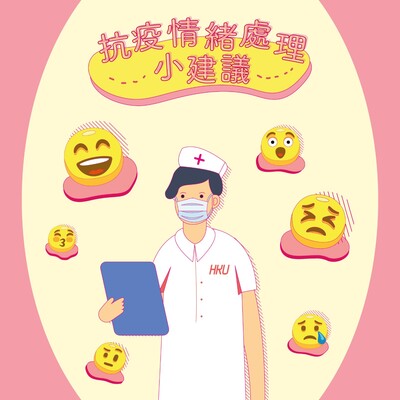 |
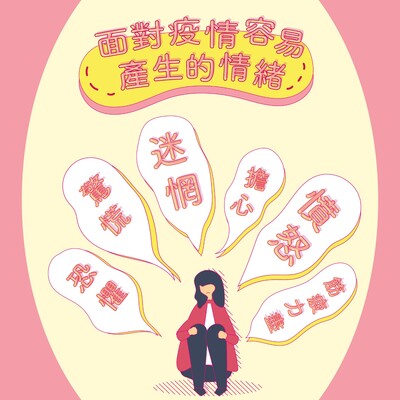 |
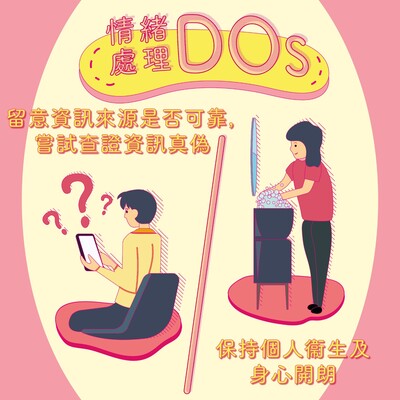 |
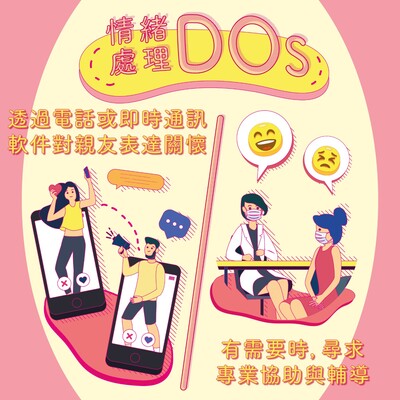 |
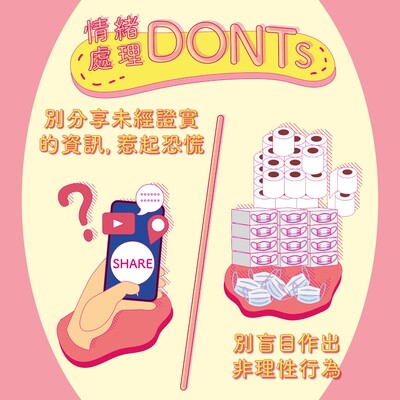 |
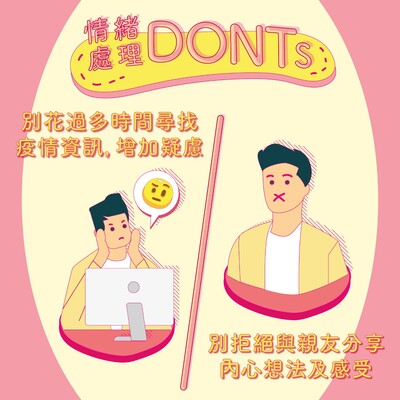 |
Washing your hands is one of the most effective ways to stop germs from spreading from one person to another. It looks simple, however, do we all really know how to wash hands properly? The following parts are usually missed during hand washing:
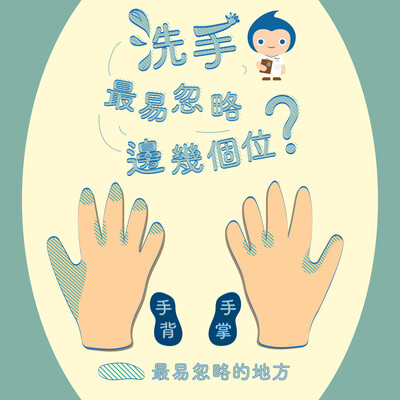
Follow the seven steps of proper hand washing for 20 seconds each time:
- Palm to plan
- Back of the hands
- Fingers interlaced
- Back of fingers
- Base of thumbs
- Fingertips
- Wrists
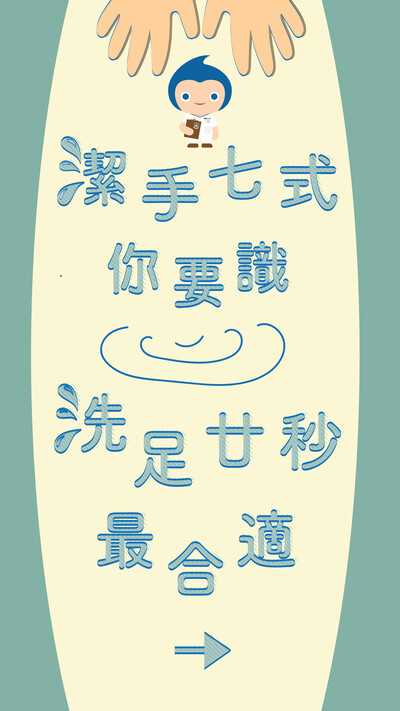 |
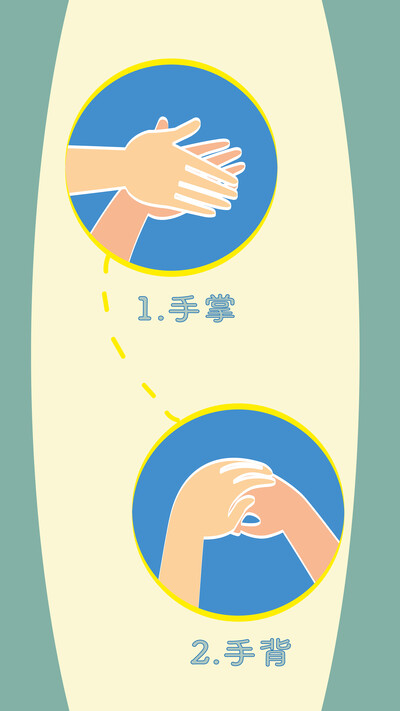 |
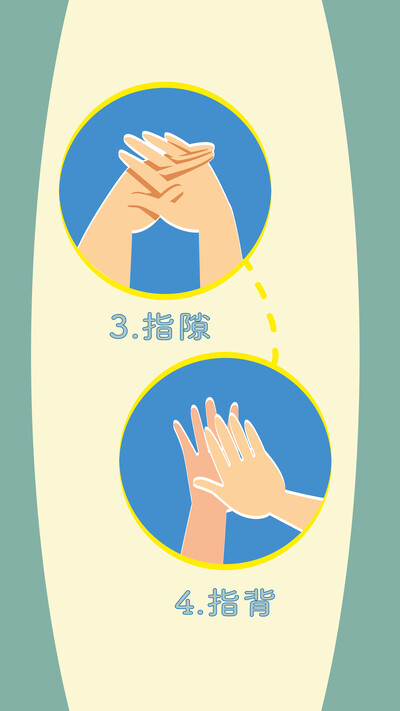 |
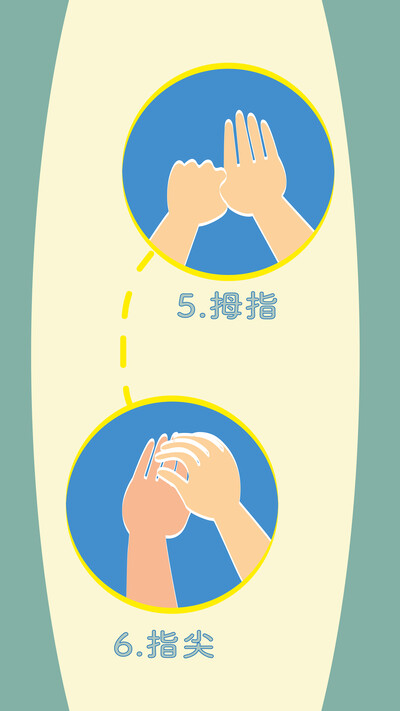 |
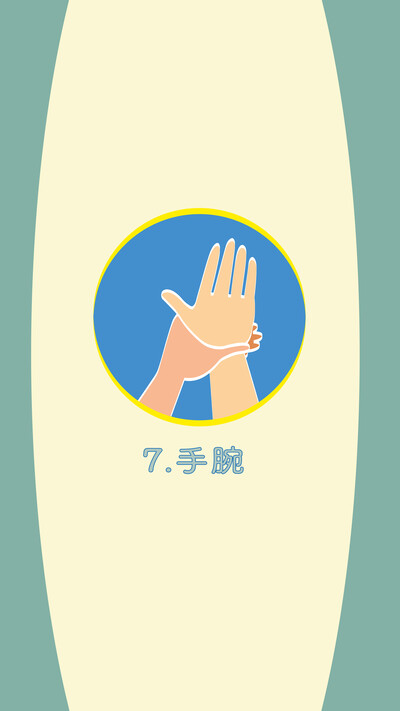 |
During times of an outbreak, people are working from home on weekdays or staying at home over weekends. One may get bored when spending less time outdoor with friends.
People are overwhelmed by the news circulating over the internet and are constantly worry about sourcing daily necessities, which take a toll on their mental well-being.
In addition to physical fitness, the School produced a video to remind the public to take care one’s mental health with the following tips:
- Smile for 20 seconds
- Walk-in-place for 10 minutes
- Avoid sharing unverified information
- Avoid hoarding daily necessities
- Stay connected with one another
Video download:
http://bit.ly/2x60vTt
In respond to the COVID-19 outbreak in Hong Kong, an online course is developed under the Hong Kong Jockey Club Nice-Link Project to empower the workers and volunteers in the elderly service units of NGO with the knowledge and competency to cope with the current pandemic situation. This 45-minute course covers:
- 1) The manifestation and transmission of COVID-19
- 2) Personal measures for preventing COVID-19
- 3) Workplace preparedness for COVID-19
All participants who completed the course and successfully completed simple tests will be granted with an attendance certificate by the HKJC NICE-LINK Programme.
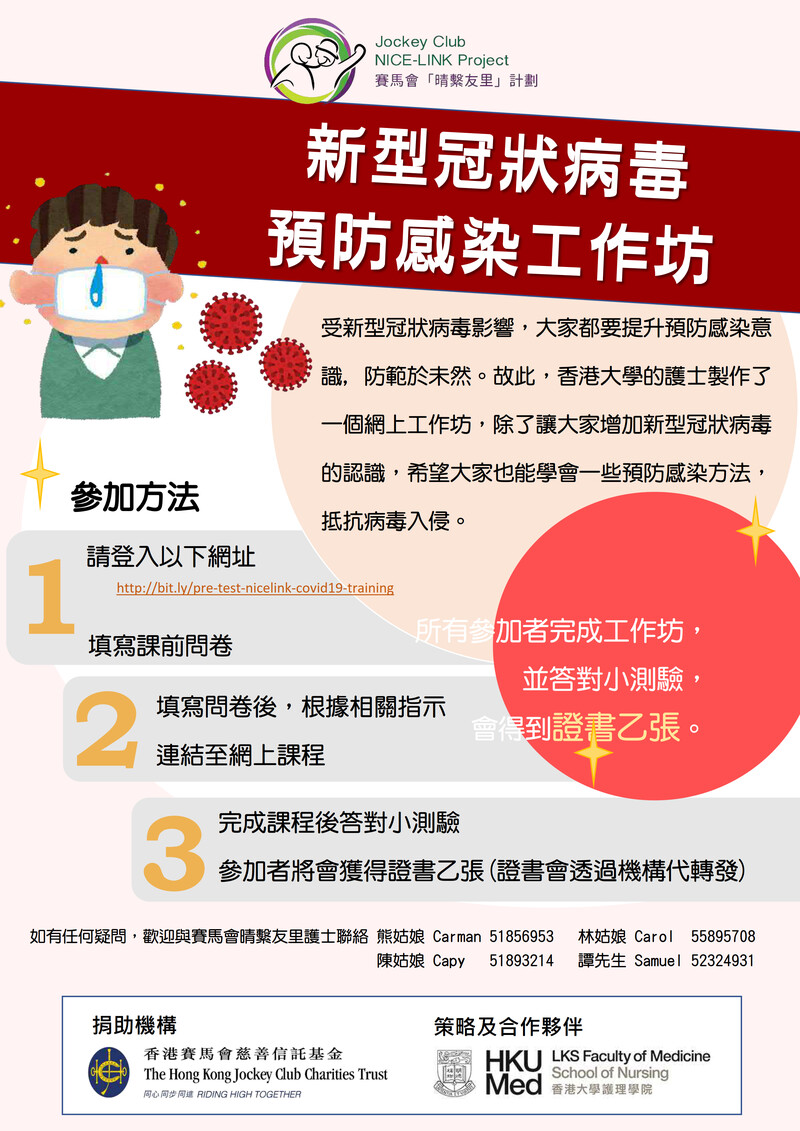
A nurse-led tele-care protocol has been developed under the HKJC-NICE-LINK Project to better address the health needs of the socially isolated older adults in Kwun Tong, Ngau Tau Kok, Wong Tai Sin and Shum Shui Po during the COVID-19 outbreak in Hong Kong.
Bi-weekly tele-care would be provided to these older adults and prompt health counselling would be provided targeting their major health concerns. A set of eight health leaflets addressing the corresponding health needs of these older adults would also be distributed, including:
- Preventive measures for COVID-19
- Healthy eating
- Home-based exercise
- Maintaining emotional health
Subsequent tele-call would be provided to follow up these older adults and a health portfolio would be created for each socially isolated older adult to enhance individual follow-up care.
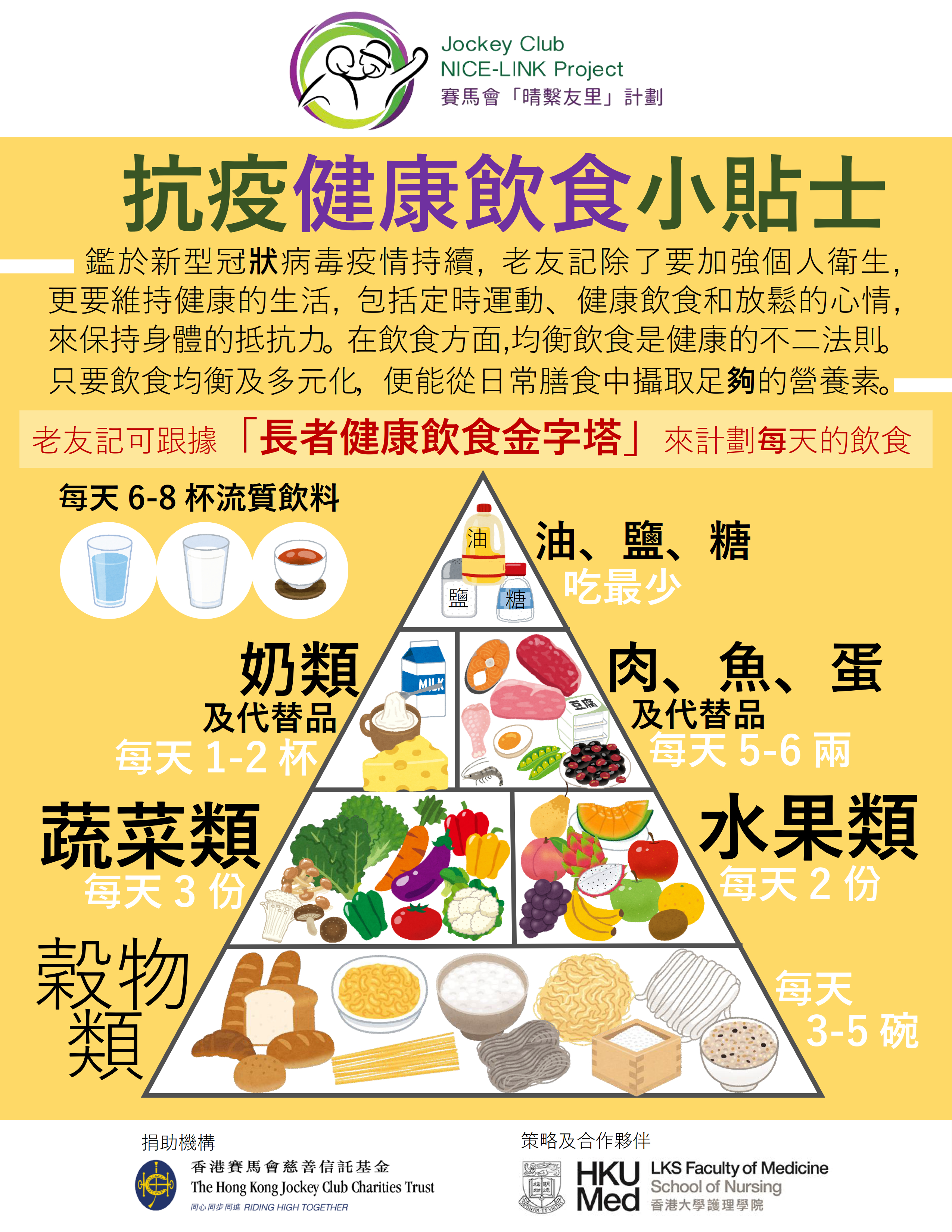 |
_1.jpg) |
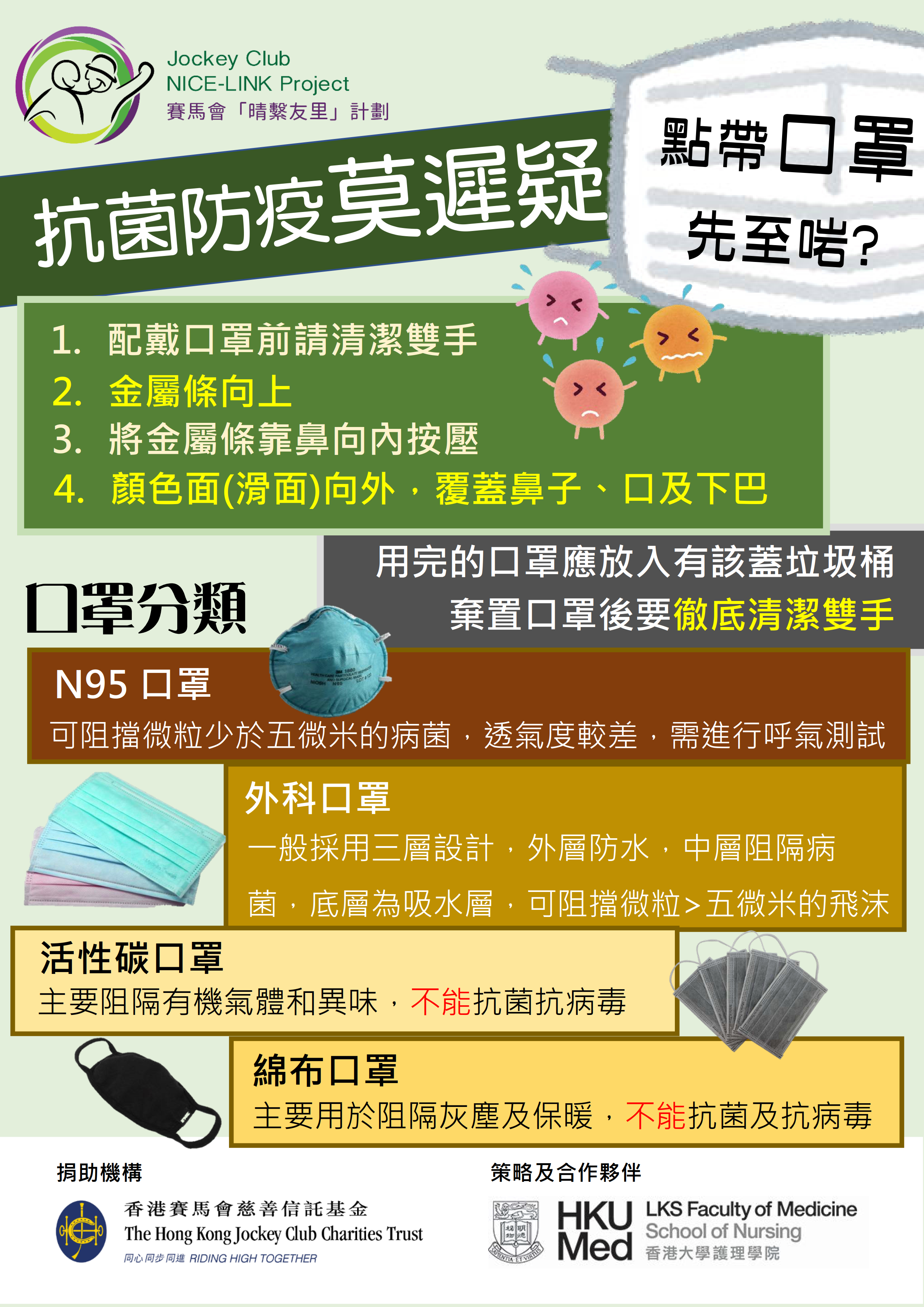 |
_1.jpg) |
_1.jpg) |
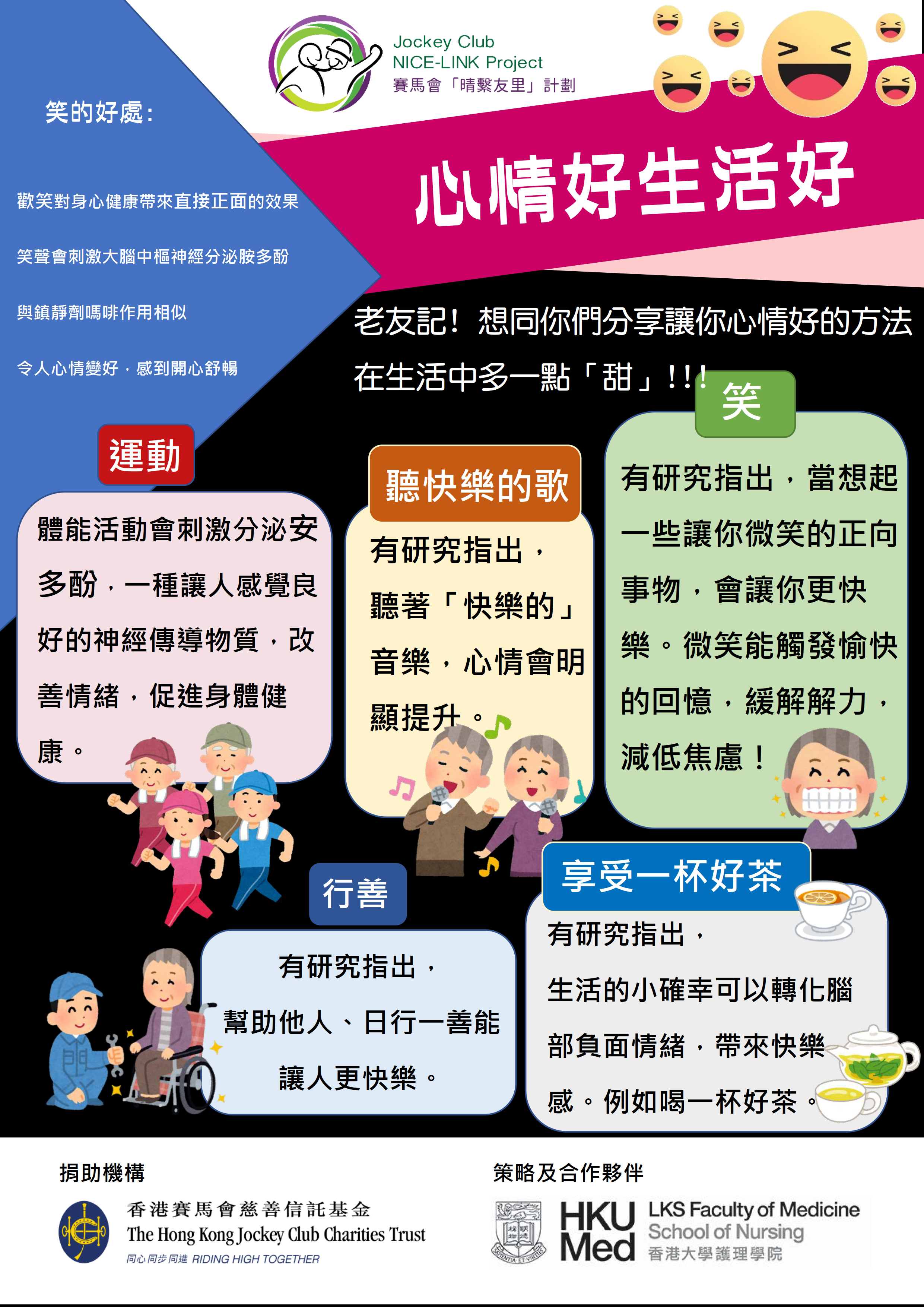 |
_1.jpg) |
_1.jpg) |
In respond to the COVID-19 outbreak in Hong Kong, a video on home hygiene was developed under the Hong Kong Jockey Club Nice-Link Project to educate the general public and the volunteers who support elderly service in Hong Kong. Five scenarios were featured in the video to help older adults understand the importance of home hygiene and how these measures could be adapted into daily life.
To learn more about COVID-19 and vaccination, do not miss out other useful education resources:
HKSAR Government COVID-19 Vaccination Programme
https://www.covidvaccine.gov.hk/en/
HKSAR Government COVID-19 Vaccine Programme Education Resources
https://www.covidvaccine.gov.hk/en/resources
HKSAR Government COVID-19 Vaccine Programme FAQs
https://www.covidvaccine.gov.hk/en/faq
HKUMed on COVID-19
https://www.med.hku.hk/en/covid-19
HKU COVID-19 Vaccination Myth-breaking Webinar Q&A
https://covid19.hku.hk/control/vaccination/webinar/

